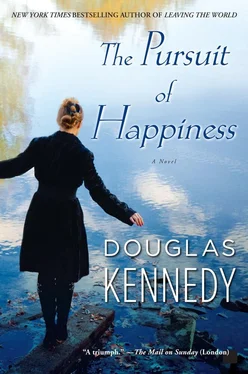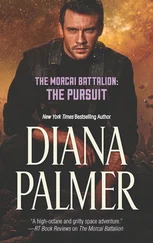'And what do you think of Joe McCarthy?' I asked.
He didn't seemed disconcerted by my challenging tone... though, frankly, I was surprised that I popped that question so directly.
'I'll be entirely straight with you, Miss Smythe. I do take the idea of a Communist menace seriously. I do think, for example, that all the evidence points to the guilt of the Rosenbergs, and that treason is a capital offence. But on the subject of Mr McCarthy... well, he genuinely worries me. Because (a) I consider him a complete opportunist who is using this Communist issue as a way of wielding power, and (b) because he has destroyed a lot of innocent people in the process'.
He looked at me directly. 'And, in my book, destroying innocent people is unforgivable'.
I met his gaze. 'I'm glad you think that way'.
He shifted the conversation towards my 'work' at the moment.
'I'm not working at the moment. No doubt, you know why'.
'We did run a piece about your brother. I'm very sorry. Is that why you came to Maine?'
'I needed to get away for a while, yes'.
'I presume Saturday/Sunday were very understanding about giving you leave'.
'Oh, they certainly wanted me on leave. Because, as far as they were concerned, my brother's refusal to play ball with HUAC meant that I was now a liability to them'.
Duncan Howell actually looked shocked. 'Tell me they didn't do that'.
'I was as stunned as you were. Especially as they knew I was about the most apolitical person imaginable. Even my poor brother had completely renounced his brief fling with Communism during the thirties'.
'But he still refused to name names'.
'Quite rightly, in my opinion'.
'It's a tough call, any way you look at it. And I can see why certain people probably thought naming names was a patriotic gesture... and why others saw it as a self-serving one. But I certainly respect your brother's high principles'.
'Look where it got him. I'll be honest with you, Mr Howell. There are times when I wish to God he'd just named names like everybody else. Because he'd still be here. And because, quite honestly, if history teaches us anything it's that today's life-or-death argument becomes a lot less consequential as years go by. What I'm saying is: sooner or later, the country will wise up and the blacklisting will end. In time, historians will probably write about this period as a political aberration; a shameful blight in our national life. And they'll be right. But my brother will still be dead and gone'.
'I'm sure he'd still want you to be writing'.
'But - haven't you heard? - I've been blacklisted too'.
'Only by Saturday/Sunday. And they haven't officially terminated you'.
As soon as this paid leave-of-absence is over, they will. And word travels fast in Manhattan. Once Saturday/Sunday fires me, I'm definitely going to be declared a journalistic untouchable'.
'Not in Brunswick, Maine, you won't'.
'Well, that's nice to know', I said with a laugh.
And I bet one of the hardest things about your enforced sabbatical is being "out of print", so to speak'.
'How did you guess that?'
'Because I've been around journalists all my life. If there's one thing they can't live without, it's an audience. I'm offering you an audience, Sara. A small audience. But an audience nonetheless'.
'Aren't you worried about employing a political hot potato like me?'
'No', he said directly.
'And what sort of thing would you want me to be writing?'
'Probably something similar to your "Real Life" column. We'd talk that through'.
'Saturday/Sunday might get a little upset, were they to discover that I was working for someone else while collecting their paycheck'.
'Did you sign a contract with them, granting them complete exclusivity to your work?'
I shook my head.
'Did they insist that you didn't write for anyone else while on leave?'
'No'.
'Then there's no problem'.
'I guess there isn't'.
'But there is, of course, the matter of money. Now, if you wouldn't mind a private question, what did they pay you weekly for your column?'
'One hundred and eighty dollars'.
Duncan Howell gulped. 'I don't even make that much', he said. 'And there's no way I could ever come near matching that. We are a small town, after all'.
'I'm not saying you have to match that. How's fifty bucks a column sound to you? That's about what I spend a week on rent and basic items'.
'It's still far more than I pay any other columnist on the paper'.
I arched my eyebrows. Duncan Howell took the hint. 'Fine, fine', he said, proffering his hand. 'Fifty a week it is'.
I took his hand. 'Nice to be back on the job', I said.
Of course, Duncan Howell was right. Though I wasn't admitting it (and kept telling myself that I really wanted a break from my typewriter), I was desperately missing my weekly fix in print. And yes, he was so damn shrewd to glean that off me. Just as he probably sensed that what I needed more than anything was work. I wasn't good at being slothful, unproductive. I needed direction, focus; a shape and a purpose to the day. Like anyone who was used to having an audience, I really craved one again. Even if my audience was no longer a national one, but the eight thousand daily readers of the Maine Gazette.
The column premiered a week after the Miss Brunswick Diner meeting. We agreed to call it 'Day-to-Day Stuff. Like the old column, it was a gently satirical commentary on prosaic matters. Only now I lost some of my usual metropolitan slant, and focused in on somewhat more homey, parochial matters: like 'Twenty-Three Dumb Uses for Kraft Velveeta Cheese'... or 'Why Leg Waxing Makes Me Always Feel Inadequate'... or (my personal favorite) 'Why Women Just Can't Relate to Beer'.
Duncan Howell insisted that I keep the flip tone which so characterized my Saturday/Sunday columns. 'Don't feel you have to write down for your audience. Mainers always know when someone's condescending to them... and they don't like it. They might take some time getting used to your style... but, eventually, you'll win them over'.
Certainly, the first few weeks of 'Day-to-Day Stuff didn't win anybody over.
'What are you doing, employing such a wiseguy gal to write such a wiseguy column in a decent, respectable paper like yours?' ran one of the first Letters to the Editor.
A week later, another torpedo landed in the Letters column. 'Maybe this sort of thing plays well in Manhattan, but Miss Smythe's world view certainly doesn't seem to have the slightest bearing on life as we live it up here. Maybe she should think about heading back south'.
Ouch.
'Don't take those letters personally', Duncan Howell said when we met again at the Miss Brunswick for a little tete-a-tete a month after the column started.
'How can I not take it personally, Mr Howell? After all, if I'm not connecting with your readers...'
'But you are connecting', he said. 'Most of the newsroom really like you. And every time I go to a dinner around town, at least one or two of the Bowdoin or local business people tell me how much they enjoy your take on things, and what a coup it was to get you for the paper. We always expect a couple of nay-sayers to complain about anything new and a little different. That's par for the course. So, please, don't fret: you're doing just fine. So fine that I was wondering... might you be willing to start writing two columns a week for us?'
'That's a joke, right?'
'No - I'm absolutely serious. I really want to get "Day-to-Day Stuff" established - and I think the best way to do this is to up the ante, so to speak... and make them read you every Monday and Friday. You game?'
'Sure, I guess. Can you afford it?'
'I'll work it out somehow'.
He held out his hand again. 'Do we have a deal?'
Читать дальше












